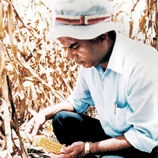 Embracing Hybrid Technology and Biotechnology in Crop Improvement
Embracing Hybrid Technology and Biotechnology in Crop Improvement
25th Anniversary Essay by 2000 World Food Prize Laureate Dr. Surinder K. Vasal
In the twentieth century, we witnessed a succession of landmark achievements that began with Green Revolutions in North America and Asia and later expanded to revolutions in the livestock and biotechnology sectors. Currently, we are in the midst of another exciting and dramatic gene revolution. With the genomes of some crop species already mapped and knowledge being generated at an accelerated pace, it is hoped that we may realize the dream of Dr. Norman Borlaug to transfer useful traits from one crop species to another.
The benefits from plant breeding research have amounted to billions of U.S. dollars, far exceeding the investments made. The real impact is realized in the developed and developing world and where self-sufficiency can be attained in food deficit countries.
Dwarfing genes, hybrid technology and biotech traits, along with improved cultural practices, made such dramatic gains in food production. In the recent past, two technologies which stand in the forefront are hybrid technology and crop biotechnology. The hybrid technology has been constantly gaining momentum, and hybrid cultivars are now grown in several crops. This has led to increased employment, expanded seed industry growth and spectacular yield gains in maize, sorghum, pearl millet and other crops.
Recently hybrid rice in China has become a great success story covering 15 million hectares. The biotech revolution is exemplary and perhaps historic covering at least 134 million hectares in 25 countries. The major biotech crops are Maize, Soybean, Canola and Cotton and the traits emphasized are Bt. and herbicide resistance.
Speaking of the next 25 years, the challenges are going to be complex and daunting because of population growth, lingering poverty, an alarming number food insecure, widespread malnutrition and micro-nutrient deficiency, declining natural resources, increased demand for livestock production and influence of global climate change. Competitive technologies existing or to be developed will be of utmost importance in wheat, rice and corn. Hybrid technology incorporating biotech traits will help resolve problems in all three crops. The pace of progress is expected to be slow in wheat and rice primarily due to seed production problems, but I am confident more resources will be devoted to hybrid research in the future.
Gains are expected to be higher in corn compared to wheat and rice for a number of reasons including higher per unit productivity, enormous genetic diversity, pre-established heterotic groups, huge resource inbred base germplasm, double haploid technology for inbred development, new and diverse inbreds from recurrent selection programs and exploiting strengths and weaknesses of maize reproductive system for seed production and breeding of abiotic stresses. Hybrid development procedure is simple and the breeder can play with bigger numbers. Inbred-hybrid technology encompasses inherent surprises and can provide solutions to multiple problems. Traits are manifested for which the parents and hybrids have never been selected before.
Many developing countries growing corn have the potential of further securing advances in yield by switching over to single crosses, and with the aid of private sector huge investments worldwide, corn genetics and biotechnology will make corn the leading crop in the world.


